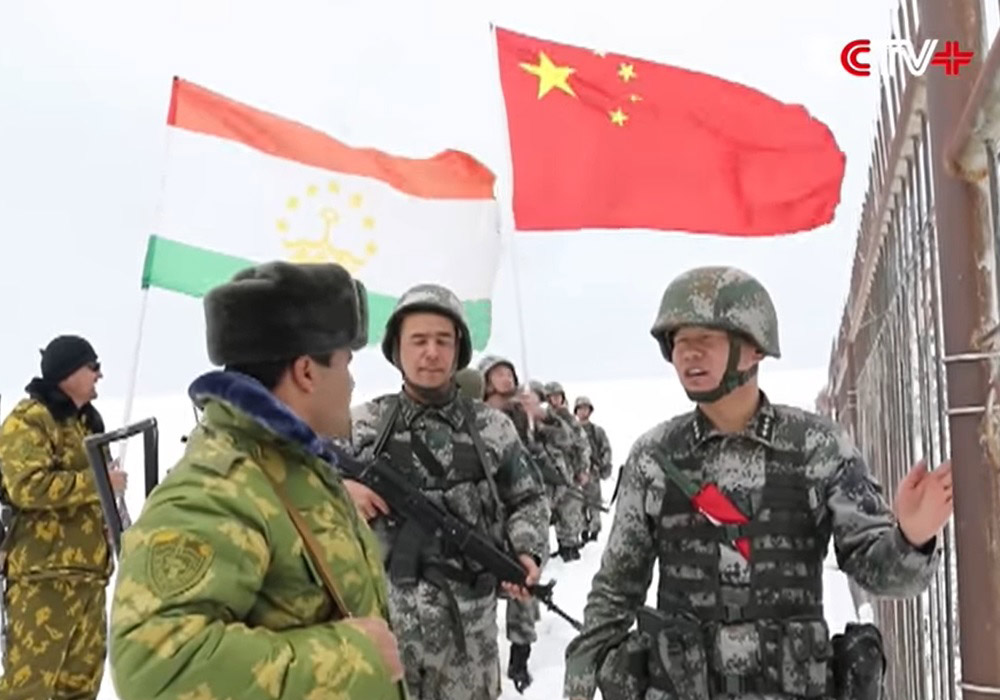This week, the rise of the Taliban to power in Afghanistan has continued to be the most striking event in the political life of not only the Central Asian region, but also the whole world. However, among the other notable events in the region were the new developments in Russia – China relations with regards to Central Asia, the expanding security presence of China with new military bases in Tajikistan, and the prospects of the emergence of a new form of regionalism in Central Asia. Digital space was also interesting during this past week, as a new debate about Cryptocurrencies in Central Asia has emerged; some believe that it will empower the Central Asian nations, while others have voiced concerns over the possibility of new national security threats arising from the reluctance of governments in this regard.

Picture: China, Tajikistan Conduct Joint Border Patrol, Emergency Drill /Source: CCTV+
Close relations between China and Afghanistan appear to be questionable for the United States. The US media have criticized the Taliban's statement on the prospects of injecting Chinese investment into the economy of Afghanistan, saying that by investing in Afghanistan, China expects to receive hundreds of millions of dollars in annual income, which is, given the current situation with the Afghan economy that has collapsed due to years of war, a priori impossible (see: Global Times, Central Asia – Caucasus ANALYST). As for the role of the United States in the region, they are pressuring not only China but also the countries of Central Asia with the goal of deploying military and intelligence facilities for the purpose of anti-terrorist activities— in view of the Taliban coming to power in Afghanistan (see: Tass, the Diplomat). This is why Russia considers it necessary to continue joint maneuvers with Uzbekistan and Tajikistan until the situation in Afghanistan stabilizes.
At the same time, the United States is not alone in activating its anti-terrorist company. It has been reported that in a remote area near the Vakhan corridor and the mountain border of Tajikistan with the northeastern part of Afghanistan, China has been developing some military structures and observation towers (See: RFERL, China Digital Times). None of the Chinese or the Tajik Governments have officially confirmed the existence of the base or the Chinese contingent, but it is clear that China's presence in the region is rapidly expanding.
Russia is also being accused of helping the Taliban. The Russian Foreign Ministry have emphasized that: “despite the fact that the situation in Afghanistan is not stable, the efforts of the Taliban terrorist organization to normalize the situation in the state did not go unnoticed” (see: Deccan Herald, Aljazeera). Russian recognition of the positive impact of Taliban policy in Afghanistan has allowed Russia to strengthen its influence in the region. Many years of contact with the Taliban has helped organize the Moscow Format conference in the Russian Federation (see: The Pioneer, The Guardian). During negotiations with diplomats from 10 countries and the Taliban, the latter's intention to combat drug crime and terrorism, as well as not to use Afghan territory against the state's neighbors, was confirmed. Despite the activities of China and Russia, it is important to note that although the foundation for protecting their interests in Afghanistan is laid, the situation in Afghanistan remains unstable and all states that play a significant role in the region will have to continue to choose a wait-and-see approach at this stage.
Beside these more or less concerning news, the region is strengthening its internal cooperation, and the political confidence between the countries of Central Asia is helping them turn their neighborhood into a more independent, predictable and sustainable region (see: Valdai). It is thanks to the new developments in the bilateral relations of Uzbekistan with Kazakhstan, Turkmenistan, Kyrgyzstan, and Tajikistan that closer regional cooperation is beginning to take shape in the region. The new arrangements have made it possible to significantly intensify trade and economic ties between the countries of Central Asia. Investment funds have been established by Uzbekistan and Tajikistan, as well as Uzbekistan and Kyrgyzstan, in order to financially support joint projects. In this context, it is worth noting the possibility of establishing cooperation between the Uzbek-Kyrgyz Investment Fund and the Russian-Kyrgyz Development Fund in order to implement projects in mining and metallurgical sectors, as well as in the textile industry, agro-industrial projects, and other spheres. (see: Voices on Central Asia).
Further interconnectedness of the Central Asian region is also being pushed for thanks to a new phenomenon in the region – cryptocurrency. On the one hand, it can be seen as an opportunity for the countries with a diaspora sending income from abroad. On the other, the governments are not in a hurry to adopt cryptocurrencies at a national level, and are rather conservative and suspicious about the crypto-mania (see: Modern Diplomacy).There is also the question of adoption strategy for the governments— will there be any adoption, and if yes, how will the cryptocurrencies be adopted? With central banks’ involvement, or through blockchain and mining? At least at this point in time, it seems that the second option is more suitable for the Central Asian states, not only because it is easier, but also because it requires a lower level of cyber-security strengthening (see: Russian International Affairs Council).

